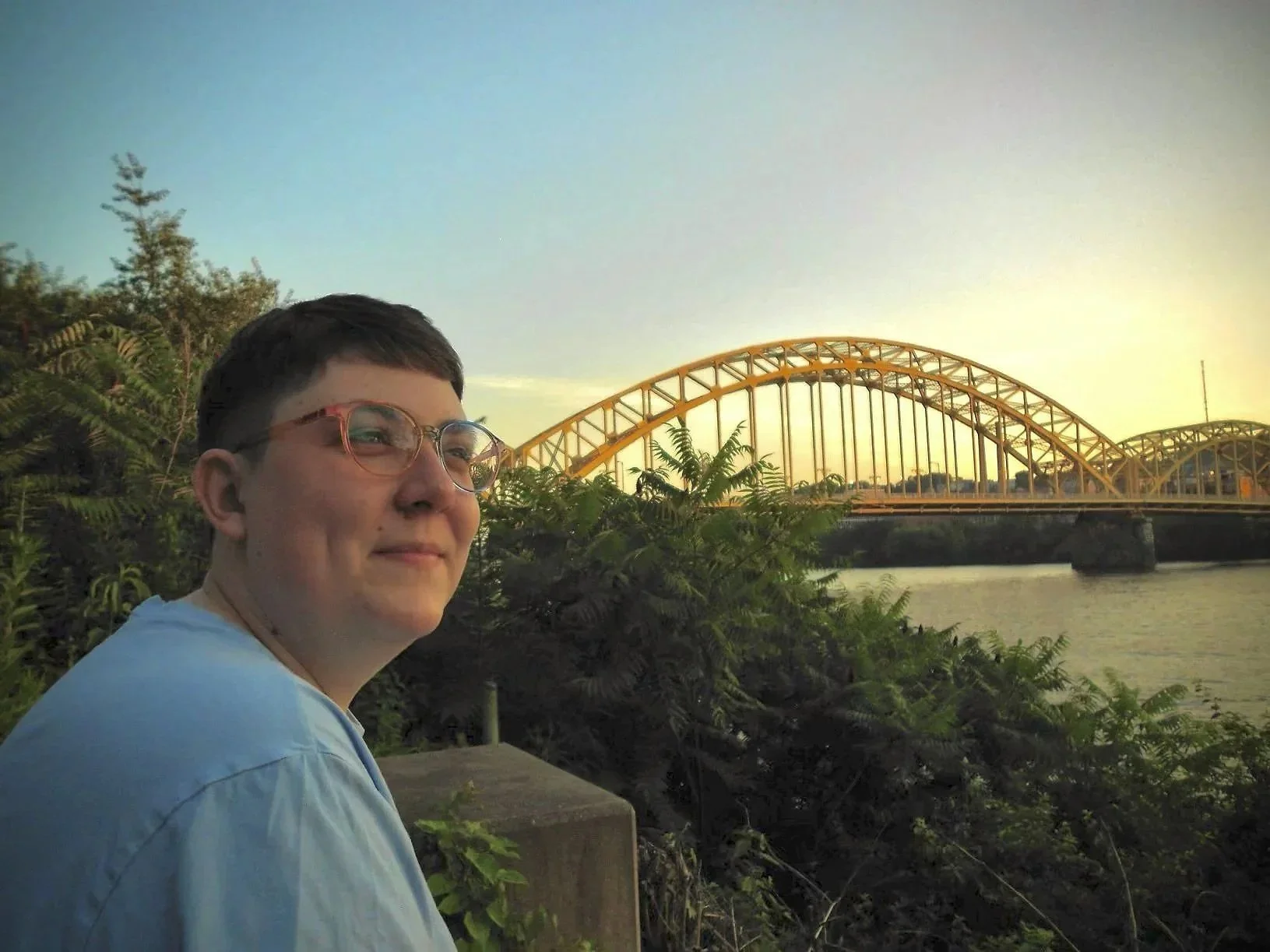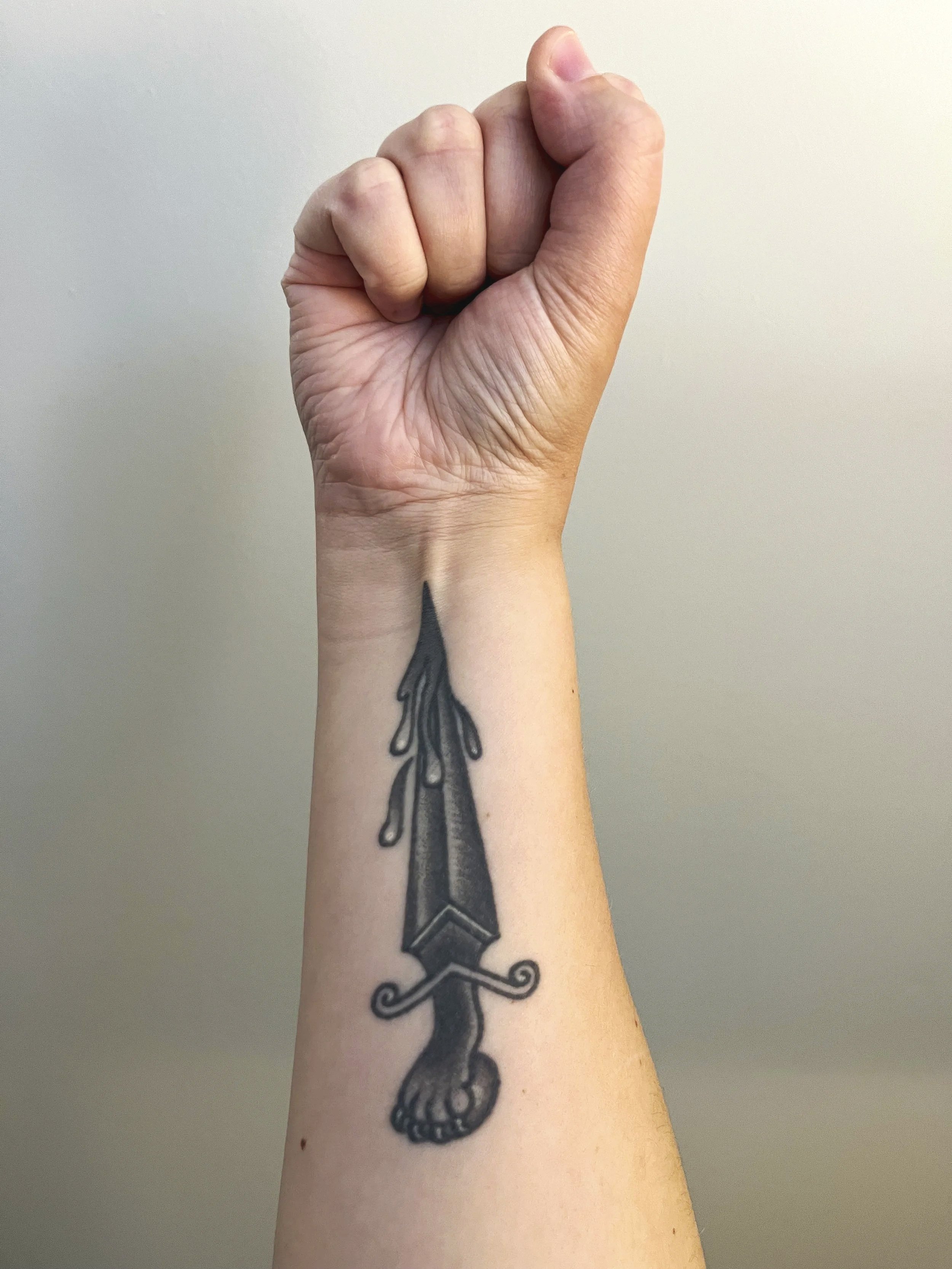Above is a picture of Kitt, standing in front of a window into a sunlit kelp forest, wearing a P100 respirator intended to prevent the transmission of COVID and other airborne pathogens. They are wearing rainbow glasses and a shirt that declares "trans joy." The other picture of Kitt on this page features them in the same glasses, looking at a sunset by a yellow bridge with wild foliage behind them.
Kitt Klassen, LCPC
Like many people, I find it can be difficult to talk about myself. You may feel this way, too, especially as you enter the vulnerable space of therapy. There’s more information below about the kind of therapy I practice, my professional experience, and the specific identities I hold, but I’d like to share some more personal information to start.
Some words I’d use to describe myself are…earnest, introverted, insightful, analytical, compassionate, curious, and partial to cats. I like to be in nature and I like to be cozy at home. I’m not very social media-savvy, so I stay offline most of the time. I enjoy puzzles, Stardew Valley, Lego, and learning. Some of my special interests include cosmology and spacetime, consciousness and theory of mind, art history, and religion and spirituality. I love listening to other people talk about their special interests, too!
If we enter a therapeutic relationship, I hope to earnestly offer my own vulnerability to the space we create, so that we can both strengthen our capacity for self-compassion and authenticity.
I enjoy working both in-person and virtually with clients, and I continue to take COVID-aware precautions in my practice and daily life. As a licensed counselor, I abide by the standards and regulations of the licensing board in the state(s) in which I practice (currently, Maryland) and the American Counseling Association code of ethics. I have been working as a counselor since 2021, finished my Master’s Degree in 2022, and began my private practice in 2024. It is a privilege to be a therapist and I hope to continue to provide competent and inclusive care for many years to come.
Two of my tattoos, pictured below, represent some of the primary ways I approach life and relationships and reflect my core beliefs and values. One is a candle, indicating my desire to hold out a light to others and the world. The other is a knife with a tiger paw handle, indicating my fierce belief in justice and human dignity. (Tattoo art by Geo Mccandlish at Fruit Camp and Alex Doucette at Have Fun Be Lucky, respectively)
Modalities through which I practice counseling:
Internal Family Systems (IFS) and parts-work-informed therapy
Visual and expressive arts, as well as other creative activities, in therapeutic work
Somatics (e.g., body-based healing)
See the following resources for more info on Somatic practicing:
My identities, privileges, and social location:
White
Neurodivergent
Trans & nonbinary (they/them pronouns)
Queer (bisexual/omnisexual)
Small fat / midsize
Primarily able-bodied but experience some chronic illness including mental health disability
Currently middle class, grew up upper-middle class; have never experienced housing or food insecurity
Heterosexual parents who are married and remain together
US citizen from birth
No religious affiliation, but assumed Anglo-Christian privilege
Hold a graduate degree and have had access to higher education through familial support
Education and Experience
-
Coursework:
Special Topics Seminar on Trauma and PTSD
Beyond the Gender/Sex Binary: Implications for Research and Practice
Human Sexuality: Counseling Approaches
Recognition:
Outstanding Graduate Student in Counseling Psychology
-
Group Facilitator - Support group for parents and caregivers of LGBTQ+ youth
Group Facilitator - Therapy group for adolescents in substance use treatment
-
One and a half years post-graduate practice at the Maryland Center for Gender & Intimacy, a private psychotherapy practice focused on therapy for sexual and gender minorities and erotically marginalized clients (2022-24)
Group Facilitator, TransFamily - Support group for parents, caregivers, and adult family members of trans and nonbinary youth
-
Introductory training in the Liberation-Focused Healing Framework through Decolonizing Therapy for Black Folk, founded and facilitated by Dr. Shawna Murray-Brown, LCSW-C, and Randall Leonard, LCSW-C, at Kindred Wellness® (2024)
EMDR Basic Training through The Center for Excellence in EMDR Therapy (2024)
Certification in Gender-Affirming Surgery Assessment through the Gender ASSET training (2022)
Foundational training in working with forced migrant and refugee clients through the Intercultural Counseling Connection (2020)
-
Legal advocacy for survivors of intimate partner violence
Funding and practical support to increase abortion access
Peer sex education and supportive resource development
View more about me at my profiles on:
Polyfriendly Professionals | Kink-Aware Professionals | Neurodivergent Therapists | Pro-Choice Therapists | Therapy Den | Therapist.com | OutCare | LGBTQ Healthcare Directory | COVID-Conscious Therapists





